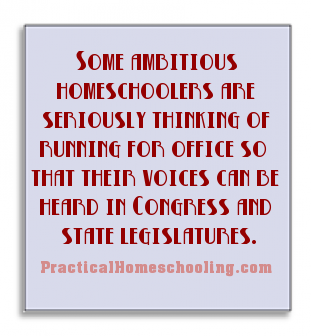 Homeschoolers generally understand that educational policy affecting the freedom of parents to educate their children at home is made by politicians in state legislatures and in Congress. The history of the Home School Legal Defense Association will testify to that fact. That is why some ambitious homeschoolers are seriously thinking of running for office so that their voices can be heard in Congress and state legislatures.
Homeschoolers generally understand that educational policy affecting the freedom of parents to educate their children at home is made by politicians in state legislatures and in Congress. The history of the Home School Legal Defense Association will testify to that fact. That is why some ambitious homeschoolers are seriously thinking of running for office so that their voices can be heard in Congress and state legislatures.
But getting involved in politics is serious business. It requires a good deal of political knowledge. In other words, it requires intellectual preparation.
If you are a homeschooler thinking of a political career my advice is to first read the Declaration of Independence and the U.S. Constitution. These documents are the blueprints of our federal system and should virtually be memorized by anyone who wants to get into government. Our Constitution calls for limited government and individual freedom.
Then start reading the biographies and memoirs of Presidents and Congressmen: Washington, Jefferson, Adams, Madison, Jackson, Henry Clay, Daniel Webster, Lincoln, Grant, Teddy Roosevelt, Wilson, Hoover, Reagan, right down to the present President. Then read the inaugural addresses of all of our Presidents to become acquainted with the variety of problems our nation has faced since its beginning. Your ability to quote from these original sources will greatly enhance your arguments.
Also, read the histories of our political parties: the Democrats, the Federalists, the Whigs, the Republicans. While President Washington spoke out against "factions," he could not prevent like-minded politicians from forming their own political parties. Each party has its own philosophy of government and seeks power in order to implement its agenda. In America, democratic elections decide which party will be able to promote its philosophy in the state houses and in Congress.
At the beginning of our national government under the Constitution, the Federalists became the initial dominant party. They were advocates of Alexander Hamilton's financial policies, favored neutrality in foreign affairs, and the firm enforcement of the nation's laws. In later years they became very critical of the Southern Oligarchy's pro-slavery policies.
The Democratic Party was organized by Thomas Jefferson to oppose the foreign and domestic policies of the Federalist Party. They were strong advocates of states' rights and individual liberty. But after the Louisiana Purchase, they adopted more liberal Constitutional doctrines. They also defended the rights of Southern states to maintain the slave system.
Once you begin studying the evolution of America's political parties you begin to understand what politics is all about in a free society governed by our great Constitution.
Our greatest domestic crisis came in 1860 with the election of Abraham Lincoln as President. The issue of slavery had so divided the nation that the Southern states seceded from the Union in order to preserve the institution of slavery. But when the Confederates fired on Fort Sumter in Charleston harbor, Lincoln called this a rebellion, and vowed to destroy the Confederacy. The rest is history.
Today our political parties have again deeply divided our nation philosophically and morally. The Democrats, the left-wing of American politics, favor more social programs, more commitment to government education, abortion on demand, same-sex marriage, gay rights, socialized medicine and a very confused defense policy. The party is strongly supported by the National Education Association, the teachers' union, which is opposed to homeschooling. Sadly, the Democrat Party is essentially anti-parental home education.
The Republican Party is nominally the conservative party of America. While many conservatives are disappointed with President Bush's lack of a truly conservative philosophy of government, the Party still remains the nation's bulwark against the excesses of the left. When Bush leaves the White House we can expect a revolution in the Republican Party. Who will be President? Your guess is as good as mine.
While some conservatives believe that we need a third party that will promote a genuine conservative agenda, third parties have had very little success in the past. The reason? The inability to raise large amounts of money for their candidates. National politics in America today requires lots of money to pay for television, media advertising, and get out the vote drives. However, in local elections, volunteerism can make a big difference.
And so, if you want to get involved in a political campaign, make sure your candidate strongly favors home education. It might be a good idea to simply write a letter to each candidate and ask for their stand on homeschooling. You may even find a candidate who is actually a homeschooling mom or dad.